It looks like you're using an Ad Blocker.
Please white-list or disable AboveTopSecret.com in your ad-blocking tool.
Thank you.
Some features of ATS will be disabled while you continue to use an ad-blocker.
share:
The Doomsday Clock has moved closer to ‘midnight’ and the end of the world as we know it.
The last time it got so ‘late’ was in 1984 when the Cold War took a turn for the worse and East v West relations briefly ceased. Before that it was 1949 when the Soviets successfully tested the H-bomb and were able to compete with the West in the nuclear arms race. The only time it’s been closer was in 1953 (2 minutes) and highlights the assertion that the world is in a fairly bad place and a new nuclear arms race appears to have begun.
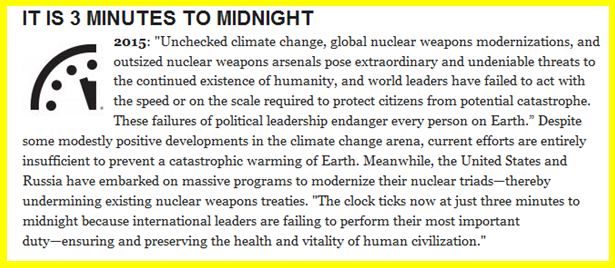
The image below shows the historical number of nuclear warheads possessed by the USA (blue) and Russia (red).
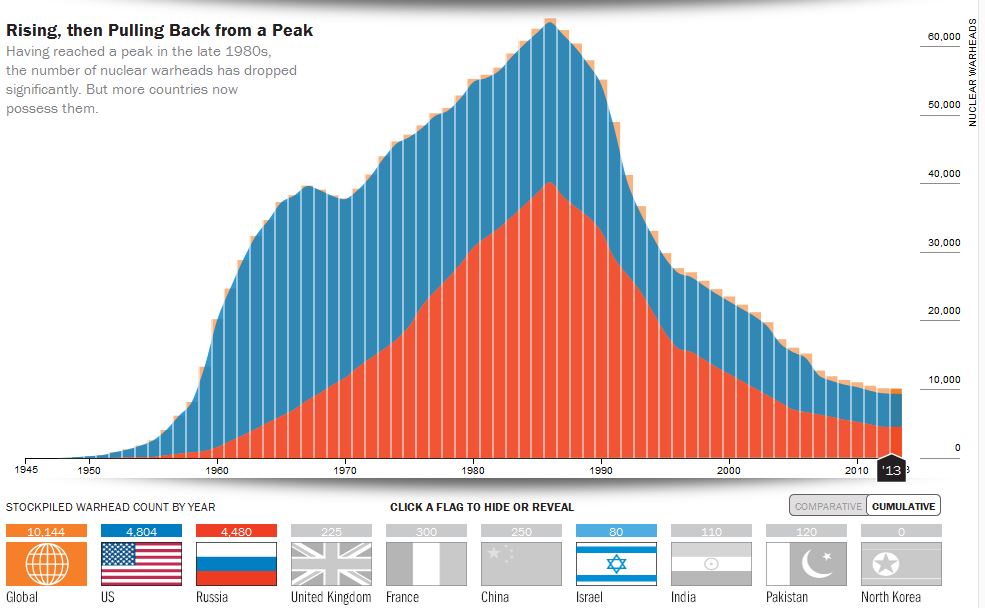
As usual, it’s a failure of diplomacy and our leaders seem to be less focused on peace than they are on appearing resolute. US Republicans in Congress are hoping to reintroduce Cruise missiles to Europe to be ‘robust’ in the face of rising Russian tensions. We’ve had submarine intrusions from Russia and their capacity to deliver cruise missiles is making some Western leaders skittish and others hawkish. This is combined with the recent test of an ICBM capable of striking 5000km away – well within US borders. Throw in the shipping container warheads and we have a situation fraught with tensions.
Borei Class submarine
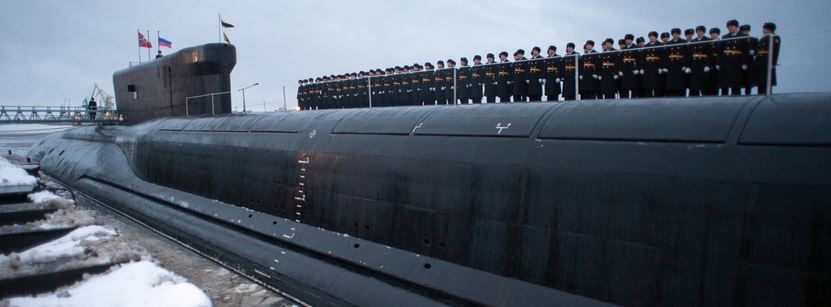
Of course, none of this leaves Western leaders as innocent responders to Russian threats. When has it ever been so simple? It’s a long-held annoyance in Russia that NATO is developing an anti-ballistic missile shield in Eastern Europe. Arguably, Russia’s sabre-rattling is increasing in volume as they seek to reassert their powers and international status. The shield has been listed as the ‘fourth greatest external threat’ to the country although NATO thinks they're overreacting.. Other significant threats reflect the same fears as any nation on Earth: 'extremism and terrorism, proliferation of weapons of mass destruction and rocket technology and actions of foreign intelligence services.' RT link
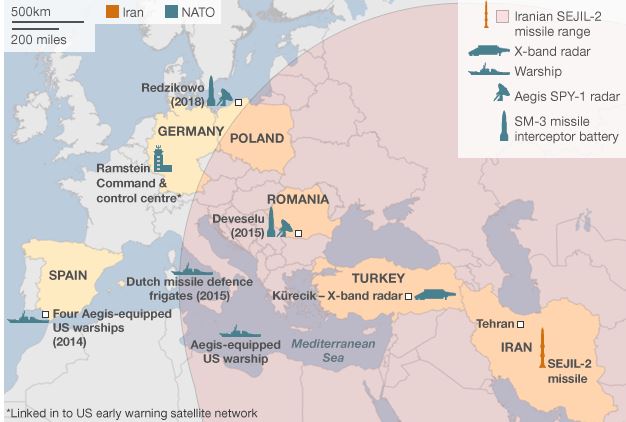
Away from the East v West dynamics we have ongoing troubles in the Middle East. Sure, IS get a lot of attention and yet most of the region remains unstable. Western relations with Iran might have improved slightly due to multilateral talks and apparent willingness to pull back their nuclear program. Ironically, a justification for the European ABM shield is to defend it from Iranian attack. Would the shield be required if Iran agrees to open her doors to international inspectors? Does anyone honestly see North Korea as a credible threat to the West? I only ask because they are usually cited as another reason for the shield. China is also a problem for generating a black-market in cruise missiles and technology and increasing their Naval assets..
When Russia and the US signed the ‘New Start’ agreement, they agreed to reduce nuclear warheads to 1550 - give or take a few. They also deliberately left out accountability for submarine nuclear warheads and missiles.. I say ‘deliberately’ because Medvedev and Obama were only figureheads and the details would have gotten the nod from their strategic advisers. There’s no longer an incentive to inform each other about the number of warheads being deployed within submarine fleets. On the surface, we’re to accept the idea that nobody knows who is carrying what warhead or where. Intuitively, we might speculate that each side has more effective means of keeping count than officially telling each other. Nevertheless, the possibility that our respective fleets are in each other's waters and armed with nuclear warheads is hardly soothing the tension.
Virginia-class

I wonder if the omission is possibly a reflection of the asymmetrical nature of these East/West disputes? NATO’s capabilities (reportedly) far exceed Russia’s. The West has the advantage of numbers across most, if not all, areas: navies, warheads, troops, territory, aircraft etc. Having the strategic upper hand may have led to this notable change in policy.
Arguably, Russia no longer poses an existential threat to Western nations, but does the West represent such a threat to Russian status on the international stage? I don’t know. Putin has a powerful policy known as ‘'de-escalation.'’ It essentially promises a targeted nuclear response against any nation/organisation that starts hostilities. It doesn't elevate them to military equivalence or guarantee victory should a major conflict arise. It does, however, pose a great deterrent and threat to possible enemies. An unaccountable nuclear-capable submarine fleet lends credence to the policy and should, in theory, cause hostile nations to pause.
Whatever the case, failing international relations have encouraged Russia to increase its diplomatic ‘potency’ and power by broadcasting the strength of its armoury and seeking new influence/allies with BRICS, OSCE and the Shanghai Cooperation Organization. They've also considered 'revising' the Treaty in the face of Western sanctions. In contrast, confidence in its own superiority has ramped up Western assertions of power and startled the atomic scientists enough to push the hands of the Doomsday Clock from ‘5 minutes’ to ‘3 minutes.’
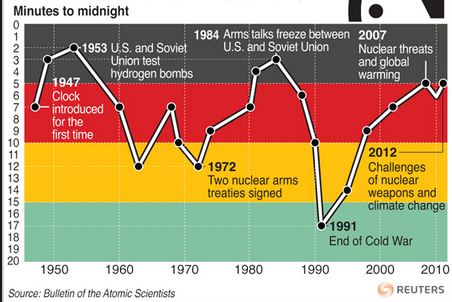
I’m old enough to remember the 1980s and the world back then seemed to be in a similar mess. Alongside the Cold war, there were major conflicts in the Middle East with fatwas and jihadis promising to bring hostilities to the West. As I look to the next couple of years, I can honestly say that I feel anxious. The world constantly falls back from the precipice and I get that. There’s no point in worrying too much and I get that too. However, when I peer dimly into the future, I can’t help feeling we (humanity in general) are going into a time of darkness. On several levels the symbolic clock resonates with my own sense that humanity has, once more, lost its direction.
The last time it got so ‘late’ was in 1984 when the Cold War took a turn for the worse and East v West relations briefly ceased. Before that it was 1949 when the Soviets successfully tested the H-bomb and were able to compete with the West in the nuclear arms race. The only time it’s been closer was in 1953 (2 minutes) and highlights the assertion that the world is in a fairly bad place and a new nuclear arms race appears to have begun.

The image below shows the historical number of nuclear warheads possessed by the USA (blue) and Russia (red).

As usual, it’s a failure of diplomacy and our leaders seem to be less focused on peace than they are on appearing resolute. US Republicans in Congress are hoping to reintroduce Cruise missiles to Europe to be ‘robust’ in the face of rising Russian tensions. We’ve had submarine intrusions from Russia and their capacity to deliver cruise missiles is making some Western leaders skittish and others hawkish. This is combined with the recent test of an ICBM capable of striking 5000km away – well within US borders. Throw in the shipping container warheads and we have a situation fraught with tensions.
Borei Class submarine

Of course, none of this leaves Western leaders as innocent responders to Russian threats. When has it ever been so simple? It’s a long-held annoyance in Russia that NATO is developing an anti-ballistic missile shield in Eastern Europe. Arguably, Russia’s sabre-rattling is increasing in volume as they seek to reassert their powers and international status. The shield has been listed as the ‘fourth greatest external threat’ to the country although NATO thinks they're overreacting.. Other significant threats reflect the same fears as any nation on Earth: 'extremism and terrorism, proliferation of weapons of mass destruction and rocket technology and actions of foreign intelligence services.' RT link

Away from the East v West dynamics we have ongoing troubles in the Middle East. Sure, IS get a lot of attention and yet most of the region remains unstable. Western relations with Iran might have improved slightly due to multilateral talks and apparent willingness to pull back their nuclear program. Ironically, a justification for the European ABM shield is to defend it from Iranian attack. Would the shield be required if Iran agrees to open her doors to international inspectors? Does anyone honestly see North Korea as a credible threat to the West? I only ask because they are usually cited as another reason for the shield. China is also a problem for generating a black-market in cruise missiles and technology and increasing their Naval assets..
When Russia and the US signed the ‘New Start’ agreement, they agreed to reduce nuclear warheads to 1550 - give or take a few. They also deliberately left out accountability for submarine nuclear warheads and missiles.. I say ‘deliberately’ because Medvedev and Obama were only figureheads and the details would have gotten the nod from their strategic advisers. There’s no longer an incentive to inform each other about the number of warheads being deployed within submarine fleets. On the surface, we’re to accept the idea that nobody knows who is carrying what warhead or where. Intuitively, we might speculate that each side has more effective means of keeping count than officially telling each other. Nevertheless, the possibility that our respective fleets are in each other's waters and armed with nuclear warheads is hardly soothing the tension.
Virginia-class

I wonder if the omission is possibly a reflection of the asymmetrical nature of these East/West disputes? NATO’s capabilities (reportedly) far exceed Russia’s. The West has the advantage of numbers across most, if not all, areas: navies, warheads, troops, territory, aircraft etc. Having the strategic upper hand may have led to this notable change in policy.
Arguably, Russia no longer poses an existential threat to Western nations, but does the West represent such a threat to Russian status on the international stage? I don’t know. Putin has a powerful policy known as ‘'de-escalation.'’ It essentially promises a targeted nuclear response against any nation/organisation that starts hostilities. It doesn't elevate them to military equivalence or guarantee victory should a major conflict arise. It does, however, pose a great deterrent and threat to possible enemies. An unaccountable nuclear-capable submarine fleet lends credence to the policy and should, in theory, cause hostile nations to pause.
Whatever the case, failing international relations have encouraged Russia to increase its diplomatic ‘potency’ and power by broadcasting the strength of its armoury and seeking new influence/allies with BRICS, OSCE and the Shanghai Cooperation Organization. They've also considered 'revising' the Treaty in the face of Western sanctions. In contrast, confidence in its own superiority has ramped up Western assertions of power and startled the atomic scientists enough to push the hands of the Doomsday Clock from ‘5 minutes’ to ‘3 minutes.’

I’m old enough to remember the 1980s and the world back then seemed to be in a similar mess. Alongside the Cold war, there were major conflicts in the Middle East with fatwas and jihadis promising to bring hostilities to the West. As I look to the next couple of years, I can honestly say that I feel anxious. The world constantly falls back from the precipice and I get that. There’s no point in worrying too much and I get that too. However, when I peer dimly into the future, I can’t help feeling we (humanity in general) are going into a time of darkness. On several levels the symbolic clock resonates with my own sense that humanity has, once more, lost its direction.
It doesn't surprise me. In general the past few years have been a wonder of unraveling stability across the globe both in terms of military and
financial. It wouldn't take much for the whole house of cards to come tumbling down. And I really think climate is the least of it.
I remember that era, too. Vietnam (endless war), the "Cold" War (endless arms race). Looking back I see the parallels. The difference today, the
Soviets and their alliance the "Warsaw Pact", encroaching and threatening eastern europe and places like Cuba and South and central America, now its
the other way round. Now NATO threatens at Russia's door and else where, over there (the Middle East).
Back then the Soviets violated national sovereignty in occupied nations of Eastern Europe, now NATO does that. Back then the Soviet Police State oppressed its citizens, arrested them for little cause, detained them without charge, imprisoning its own citizens without a fair trial. Now we do.
All the players and geography are the same, the roles are reversed. Back then, the Soviets were made out to be the "Evil Empire" for all the very same things we do today.
Back to the brink…
Back then the Soviets violated national sovereignty in occupied nations of Eastern Europe, now NATO does that. Back then the Soviet Police State oppressed its citizens, arrested them for little cause, detained them without charge, imprisoning its own citizens without a fair trial. Now we do.
All the players and geography are the same, the roles are reversed. Back then, the Soviets were made out to be the "Evil Empire" for all the very same things we do today.
Back to the brink…
edit on 8-3-2015 by intrptr because: spelling
I saw this a few weeks ago and am not surprised.
www.abovetopsecret.com...
Perilous times we live in, and yes, I grew up in the 70's, so I have context to compare.
Back then I was more hopeful due to MAD. To me our current situation is more unstable, thus more unpredictable.
Many more countries in the 'club' equals many more scenarios for the unthinkable.
Add all the nuclear rhetoric and mans propensity for destruction and it is almost inevitable.
www.abovetopsecret.com...
Perilous times we live in, and yes, I grew up in the 70's, so I have context to compare.
Back then I was more hopeful due to MAD. To me our current situation is more unstable, thus more unpredictable.
Many more countries in the 'club' equals many more scenarios for the unthinkable.
Add all the nuclear rhetoric and mans propensity for destruction and it is almost inevitable.
a reply to: intrptr
Yeah, it used to seem clearer that we were the good guys and anyone else was against freedom and democracy. Now it's less clear and getting less clear by the year. It's not like Russia, China or Islamic State Caliphates are somehow morally superior...they aren't. Instead we seem to be just as responsible as anyone else for the instability in the world.
A metaphorical Doomsday won't be avoided by engaging in multiple simultaneous conflicts that never seem to conclude. Where's the peace?
All the players and geography are the same, the roles are reversed. Back then, the Soviets were made out to be the "Evil Empire" for all the very same things we do today.
Yeah, it used to seem clearer that we were the good guys and anyone else was against freedom and democracy. Now it's less clear and getting less clear by the year. It's not like Russia, China or Islamic State Caliphates are somehow morally superior...they aren't. Instead we seem to be just as responsible as anyone else for the instability in the world.
A metaphorical Doomsday won't be avoided by engaging in multiple simultaneous conflicts that never seem to conclude. Where's the peace?
a reply to: stosh64
Same here. When the Berlin Wall came down, a lot of people around the world thought nuclear catastrophe was no longer a threat. It seemed to point to a future time where diplomacy and communication would dominate in a world of increasing peace.
Crazy dreams eh?
Same here. When the Berlin Wall came down, a lot of people around the world thought nuclear catastrophe was no longer a threat. It seemed to point to a future time where diplomacy and communication would dominate in a world of increasing peace.
Crazy dreams eh?
originally posted by: intrptr.
All the players and geography are the same, the roles are reversed. Back then, the Soviets were made out to be the "Evil Empire" for all the very same things we do today.
I disagree, It is far from being the same scenario as the cold war.
China, India, Pakistan, N Korea, Israel, Iran, various ambitious radical groups added on to the old scenario of a rather stabilizing policy of mutually assured destruction between the only 2 nuclear powers.
Much more opportunity for the unthinkable than there was 35 years ago.
edit on 3 8 2015 by stosh64 because: added china
Part of the problem I am seeing is that the US tried to address an unconventional problem with a conventional solution. In all fairness, there is no
sure strategy for addressing the problem at hand. But every time paradigms of war shift in some way, you have a problem like what we're seeing.
The last time is what the realization that conventional war was being made obsolete by atomic weapons and the horrible realization that we could very possibly destroy ourselves in our rush to make sure we could blow the other guy up bigger and better.
In this case, we have an ideology making war and as such there is no conventional strategy that will work because an ideology recognizes no flags. There is, simply put, no there to make war on until it is defeated. So we flail around and look as bad as everyone else and whole effect is destabilizing.
The last time is what the realization that conventional war was being made obsolete by atomic weapons and the horrible realization that we could very possibly destroy ourselves in our rush to make sure we could blow the other guy up bigger and better.
In this case, we have an ideology making war and as such there is no conventional strategy that will work because an ideology recognizes no flags. There is, simply put, no there to make war on until it is defeated. So we flail around and look as bad as everyone else and whole effect is destabilizing.
a reply to: Kandinsky
Not only the EU, but also Russia acknowledges the dangerous road we`re on right now...that`s at least something.
Russia invites NATO Members to Security Conference: Experts warn about Risk of unwanted Nuclear War
Source
Not only the EU, but also Russia acknowledges the dangerous road we`re on right now...that`s at least something.
Russia invites NATO Members to Security Conference: Experts warn about Risk of unwanted Nuclear War
Russia has invited all NATO member States and the NATO leadership to attend a security conference in mid-April, said the Russian Deputy Defense Minister Anatoly Antonov. The invitation comes against the backdrop of deteriorating relations between members of the Atlantic Alliance and Russia. Meanwhile, during a recent symposium, experts warned about the risk of a military escalation that includes the use of nuclear weapons, whether it be wanted or unwanted.
Source
a reply to: BornAgainAlien
I think most nations realise that we're on a dangerous road and we just don't appear to have an appropriate strategy. By that I mean one that benefits the greater amount of parties instead of benefiting the few.
I honestly can't foresee a situation where the West or Russia would fire missiles at each other - certainly not in the next couple of years. The problem is we all seem to be acting like it's a genuine possibility and acting accordingly!
I think most nations realise that we're on a dangerous road and we just don't appear to have an appropriate strategy. By that I mean one that benefits the greater amount of parties instead of benefiting the few.
I honestly can't foresee a situation where the West or Russia would fire missiles at each other - certainly not in the next couple of years. The problem is we all seem to be acting like it's a genuine possibility and acting accordingly!
a reply to: Kandinsky
A metaphorical Doomsday won't be avoided by engaging in multiple simultaneous conflicts that never seem to conclude. Where's the peace?
"Peace is not solely a matter of military or technical problems — it is primarily a problem of politics and people. And unless man can match his strides in weaponry and technology with equal strides in social and political development, our great strength, like that of the dinosaur, will become incapable of proper control — and like the dinosaur vanish from the earth." --John F. Kennedy
Peace
a reply to: Kandinsky
If there were only people now in the US government realizing that both China and Russia aren`t going anywhere, and make plans to somehow reset the massive amount of debts of the Western World, we would be a lot better off.
If they want, a solution can be found where the burden of World police would be simply shared by NATO/China/Russia together. Because, the situation where US needs such ridiculousness amounts of money to keep the War machine going or else the Petrodollars doesn`t survive isn`t going to end well.
If there were only people now in the US government realizing that both China and Russia aren`t going anywhere, and make plans to somehow reset the massive amount of debts of the Western World, we would be a lot better off.
If they want, a solution can be found where the burden of World police would be simply shared by NATO/China/Russia together. Because, the situation where US needs such ridiculousness amounts of money to keep the War machine going or else the Petrodollars doesn`t survive isn`t going to end well.
How many of us here on ATS feel we will be nuked here on US soil before 2015 ends?
The answer to this may likely be a microcosmic view to why the Doomsday Clocks has struck closer to midnight. The entire world seems to be holding our breath.
The answer to this may likely be a microcosmic view to why the Doomsday Clocks has struck closer to midnight. The entire world seems to be holding our breath.
originally posted by: stosh64
I saw this a few weeks ago and am not surprised.
www.abovetopsecret.com...
Me too.
I thought the OP was claiming it had moved again.
Misleading title.
2015: "Unchecked climate change"
Given "unchecked" climate change is the first issue they mention...
I'll take it with a grain of salt as I SMH and LOL my way towards hitting the "reply" button.
Doomsday... Pffft!
so right statement !
__The clock ticks now at just three minutes to midnight because international leaders are failing to perform their most important duty—ensuring and preserving the health and vitality of human civilization." .......
thebulletin.org...
we are just betrayed by oure own leaders !
__The clock ticks now at just three minutes to midnight because international leaders are failing to perform their most important duty—ensuring and preserving the health and vitality of human civilization." .......
thebulletin.org...
we are just betrayed by oure own leaders !
new topics
-
More Bad News for Labour and Rachel Reeves Stole Christmas from Working Families
Regional Politics: 1 hours ago -
Light from Space Might Be Travelling Instantaneously
Space Exploration: 2 hours ago -
The MSM has the United Healthcare assassin all wrong.
General Conspiracies: 3 hours ago -
2025 Bingo Card
The Gray Area: 3 hours ago -
The Mystery Drones and Government Lies
Political Conspiracies: 5 hours ago
top topics
-
Pelosi injured in Luxembourg
Other Current Events: 12 hours ago, 16 flags -
The Mystery Drones and Government Lies
Political Conspiracies: 5 hours ago, 9 flags -
Nov 2024 - Former President Barack Hussein Obama Has Lost His Aura.
US Political Madness: 13 hours ago, 7 flags -
2025 Bingo Card
The Gray Area: 3 hours ago, 5 flags -
The MSM has the United Healthcare assassin all wrong.
General Conspiracies: 3 hours ago, 5 flags -
Light from Space Might Be Travelling Instantaneously
Space Exploration: 2 hours ago, 2 flags -
More Bad News for Labour and Rachel Reeves Stole Christmas from Working Families
Regional Politics: 1 hours ago, 1 flags
active topics
-
2025 Bingo Card
The Gray Area • 8 • : gortex -
More Bad News for Labour and Rachel Reeves Stole Christmas from Working Families
Regional Politics • 1 • : nugget1 -
The Mystery Drones and Government Lies
Political Conspiracies • 24 • : xuenchen -
I See a Different Attitude This Time Around with Congress
US Political Madness • 29 • : interupt42 -
-@TH3WH17ERABB17- -Q- ---TIME TO SHOW THE WORLD--- -Part- --44--
Dissecting Disinformation • 3676 • : duncanagain -
Light from Space Might Be Travelling Instantaneously
Space Exploration • 13 • : cooperton -
A Bunch of Maybe Drones Just Flew Across Hillsborough County
Aircraft Projects • 82 • : xuenchen -
Post A Funny (T&C Friendly) Pic Part IV: The LOL awakens!
General Chit Chat • 7908 • : baddmove -
The MSM has the United Healthcare assassin all wrong.
General Conspiracies • 4 • : Solvedit -
Top Sci Fi/Horror Crossover Movies
Movies • 15 • : LocutusofBorg001
